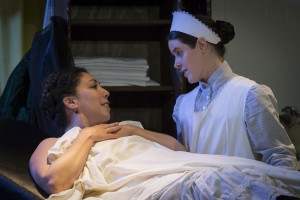Better Living Through Electricity: A Stimulating VIBRATOR PLAY at the MET
Theater Reviews Page | Previous Theater Review | Next Theater Review
Better Living Through Electricity: A Stimulating VIBRATOR PLAY at the MET
Posted on BroadwayWorld.com June 2, 2014
Sure, In the Next Room (or the Vibrator Play) is not Raisin in the Sun. But just as Lorraine Hansberry‘s classic embraced all of the issues surrounding race in 1959, so Sarah Ruhl‘s 2009 offering manages to deal in two acts only with a huge sample of the issues surrounding female sexuality and reproductive life – in two eras, the Victorian years and today. We get not only the female orgasm (a given, in light of the subtitle) but childbirth, lactation, lesbianism, the discontent Betty Friedan called the feminine mystique, the loss of children, the way medicine approaches the female body, and the contents and discontents of heterosexual intercourse. And thrown in for good measure are many aspects of the social relations of men and women. The whole discourse is carefully disguised as a drawing-room comedy shot through, particularly at the end, with Marquezian magical realism.
In short, the play is a treat that keeps you not only laughing gently but thinking. The MET, Frederick’s professional ensemble troupe, is giving it a welcome revival (this seems to be about the third Maryland production).
As many know, Next Room, set in a genteel town in New York State in the 1880s, just as Thomas Edison is busy electrifying life, turns on two different Edisonian innovations: the light-bulb and what we now call the vibrator. Like teenagers fighting for the TV remote, the sexes are struggling for control of these new technologies. The men, led by the perhaps ironically-named Dr. Givings (Reiner Prochaska), see light bulbs as a convenient substitute for candles, and the “apparatus” as a medical treatment for “hysteria.” The women, led by the doctor’s sexually-frustrated wife Catherine (Allison Duvall), see light bulbs as things to be dimmed, switched off, or even made magical in the service of sex, romance, and the imagination, “hysteria” as a male label for women’s legitimate discontents, and a proto-vibrator as a way to have a wonderful time. There are no clear-cut victories in these struggles, any more than the opposition between the sexes is absolute, but by the end, the women have better lines and greater success.
The cast keeps Ruhl’s fun going strong. Lia Seltzer is Sabrina, a patient, regal with her clothes on, comically orgasmic with most of her voluminous clothes off atop the doctor’s treating table, who learns through the process what and whom she is actually craving (not her husband, it emerges). Rona Mensah is regal in a different way, as Elizabeth, an African American wet nurse trying to function after the death of a child. And Vanessa Strickland, whom I admired as Laura in The Glass Menagerie, gets everything possible out a more meager role, as Annie, the nurse who is called upon to maintain a stoic scientific look whatever “paroxysms” her apparatus or her fingers may be inducing – until she finds something her poker face is not immune to. As a man who might be Dr. William Masters’ lower-IQ grandfather, Prochaska is agreeably thick about the very subject in which he professes expertise.
Director Julie Herber keeps them all on their toes. My only criticism was that there were frequently moments when I felt a lack of clarity that the direction should not have permitted in Catherine’s motivations and those of Leo (Jack Evans), a male patient and artist, who gets treated with a different device that has the same general effect.
That effect is orgasm, of course, but it is also the breaking down of walls, the most visible of which (in the mind’s eye, anyway) is the wall separating each room from the other (and hence the title). The living room, at the outset a female space, is separated from the “operating theater,” a male space, by a wall and a locked door. The inhabitants of each space need to spend more time with those on the other side, and men need to change their paradigms of what is acceptable and desirable (the women as well, to some extent). As the barriers finally fall, the mood turns lyrical, and the action ends with a kind of latter-day echo of the wedding dance that would often finish a Shakespeare comedy.
A very amusing and uplifting time, at least for those who are mindful of Yeats’ apercu that “Love has pitched his mansion in the place of excrement.” It is about sex, but mostly because that is where love starts.
Copyright (c) Jack L. B. Gohn, except for production still
Theater Reviews Page | Previous Theater Review | Next Theater Review
